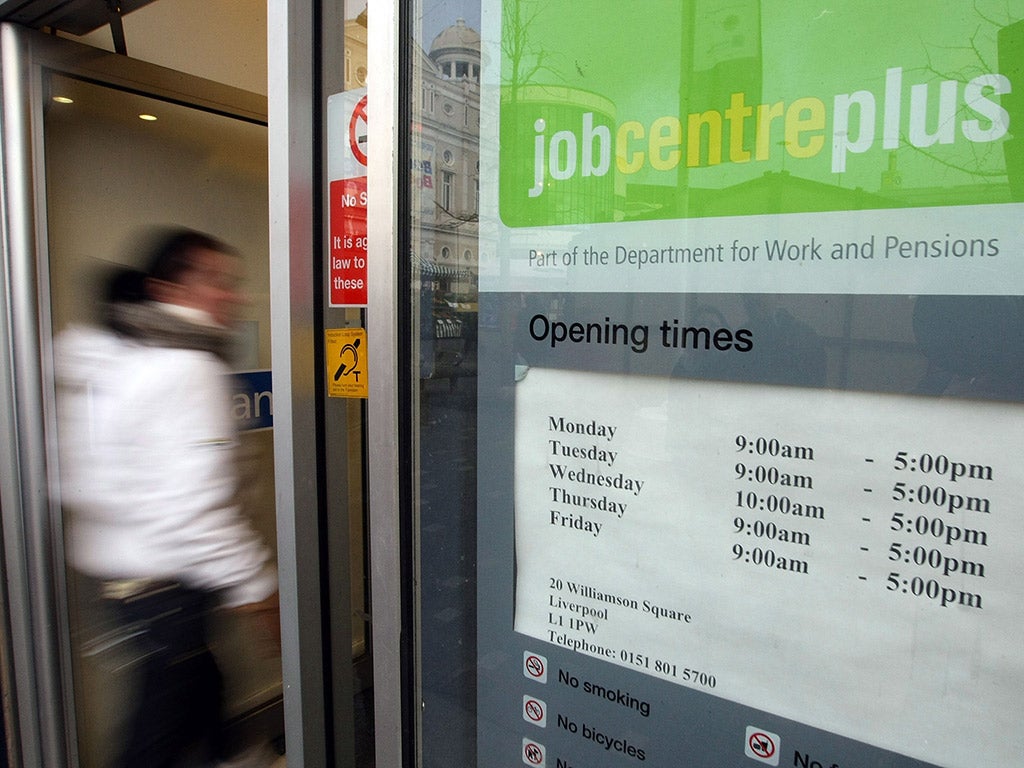Benefits sanctions don't work and plunge claimants into 'hunger and depression', National Audit Office finds
The benefit sanctions system has become a ‘postcode lottery’ and is doing more harm than good, according to the public spending watchdog

The public spending watchdog has launched a scathing attack on the benefit sanctions system, claiming that fining people for breaking the terms of benefits does more harm than good and costs more to enforce than it saves.
The National Audit Office (NAO) found that benefit sanctions were being inconsistently applied across the country, with some jobcentres being far stricter than others on people who, for example, are unable to show they have been actively seeking employment in order to claim Jobseeker’s Allowance. The watchdog found that withholding of benefits, which it found to be commonplace, plunges claimants into hardship, hunger and depression.
The NAO said the Department for Work and Pensions must launch a proper investigation into how benefit sanctions are affecting the lives of people on benefits, and to bring to an end a system it described as “pot luck” and a “postcode lottery”.
Labour’s Meg Hillier, who chairs the Public Accounts Committee, said: “Benefit sanctions punish some of the poorest people in the country. But despite the anxiety and misery they cause, it seems to be pot luck who gets sanctioned.”
She added: “While studies suggest sanctions do encourage some people back into work, other people stop claiming but do not start working and the Department for Work and Pensions has no record of them. If vulnerable people fall through the safety net, what happens to them?”
More than one million unemployed benefits claimants must meet particular conditions to receive payments.
Different jobcentres and employment schemes take radically different stances on enforcing the rules. Some were found to make more than twice as many sanction referrals as others in the same area. More than a tenth of these penalties were subsequently overturned.
Liberal Democrat leader Tim Farron said: “This report is a civil service equivalent of a character assassination. It shows that a failing department is trying to prop up a discredited system.
“The DWP has turned this system in a postcode lottery and means that someone could be sanctioned in one place and not in another for the same thing.
“What is worse is that the Government are not assessing the impact of sanctions, using their own data to see what is going on and they are not even tracking the benefits. Ministers need to get a grip.”
In the five years to 2015, almost a quarter of Jobseeker’s Allowance claimants received at least one sanction in the five years to 2015. A four week penalty for the over-25s means a £300 loss.
According to the DWP’s own estimates, it spends up to £50m a year applying sanctions and £200m monitoring that claimants meet the conditions for receiving payments.
Last year it withheld payment of £132m in the form of sanctions. It also paid out £35m in hardship payments, according to NAO estimates, many of which directly compensate for withheld benefits.
In its report, the watchdog said the department “needs to do more than react to problems” and ruled that it “cannot conclude that the department is achieving value for money”.
Amyas Morse, head of the National Audit Office, said: “Sanctions on benefits have a high opportunity cost, not only for those who are dependent on those benefits if sanctions are applied, but for the efficient use of public resources.
“We acknowledge the department's effort to reduce its error rate on sanctions, but we think there is more to do in terms of reducing them further, and in reducing the notable differences in sanctions applications between comparable localities.”
A DWP spokesman said: “Sanctions are an important part of our benefits system and it is right that there is a system in place for tackling those few who do not fulfil their commitment to find work.
“This report fails to recognise the improvements we have made to sanctions, particularly to help those who are vulnerable. The number of sanctions has fallen, and they are only ever used as a last resort after people fail to do what is asked of them in return for benefits.
“We will consider the recommendations, and respond fully in due course.”
Join our commenting forum
Join thought-provoking conversations, follow other Independent readers and see their replies
Comments